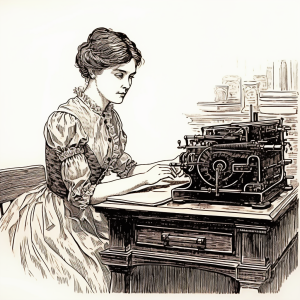AMONG THE LAUNDRY-GIRLS.
CHAPTER I.
WHY AND HOW I BECAME ONE OF THEM.
THE laundry question is like the domestic servant problem. It interests everyone in all classes of society. If it is true that “civilised man cannot live without cooks,” it is equally true that he cannot do without a laundress. Indeed, a man’s happiness is to a greater degree dependent upon his laundress than his cook. Nothing can so quickly transform a kind, thoughtful, and good-tempered man into a frightful specimen of total depravity as a badly-ironed shirtfront or a limply-starched collar. Even men of the most angelic dispositions and piously inclined have been known to lapse into profanity over just such trifles. On second thought, “trifles” is not the word I should have used, for I agree that, of all the deplorable-looking objects in the world, a man not properly “done up ” is the worst. A man’s personal appearance depends quite as much upon his shirt-fronts and collars and cuffs as a woman’s good looks depend upon the way she arranges her hair.
Despite the fact that I live in the days of the “new womanhood,” which demands stiff shirts, high collars, neckties, and waistcoats as proofs of complete “emancipation,” I still hold to the belief that boiled shirts are, or should be, a man’s exclusive property, and I can readily understand his objection to the “new woman” who, in her fierce clamour for what she calls her “rights,” will not stop to consider the wrongs she is inflicting on the opposite sex, and, not content with having, in some professions, deprived man of his means of livelihood, would now take away from him his very clothes.
There is one thing in connection with the subject of laundry work that I have never been able to understand, and that is the rooted objection that most men have to paying their washerwomen. One would think that, dependent as they are upon these women for half their life’s happiness, they would, if they could, pay them promptly and without protest. Why men always object to paying laundry bills is something beyond my comprehension. Bachelors in good standing, socially and financially, who are noted for discharging every other obligation, even to their tailors, will let the poor laundress wait for weeks, months, and sometimes years, and then allow her to sue them for her long-accumulated bill. They seem to do these things on general principles. It was but a few weeks ago that the papers reported the case of a nobleman who, out of pure contrariness, refused for three years to pay his laundry bill, although perfectly able to do so; and it was only after he was brought into court and the judge had remonstrated with him, giving him the choice of either paying up or going to gaol, that he would even consider the matter seriously. Laundresses say that men of means give them more trouble than any other customers ; and proprietors of lodging-houses and hotels assert that well-to-do men, who can always be relied upon to pay for their board and apartments when due, will each week pin their laundry accounts upon the wall, until in time the pattern of the wall-paper is almost hidden from sight by these unreceipted bills. It is easy enough to understand why the man in the state of “broke” allows such things to happen ; but why gentlemen of means should be so prejudiced is a puzzle that I doubt if even they themselves would be able to solve.
About once in a decade the public is agitated over some new or old phase of the laundry question. A few years ago the whole of the United States was nearly frightened out of existence over the subject. Somebody (I believe it was not a newspaper reporter) one day took his linen to a Chinese laundry, and saw a Chinaman in the other end of the room with a white scar on his face. “White spots are symbols of leprosy,” thought he, and then he went to talk the matter over with a medical man, who immediately got out his books on the subject. In a week the papers had taken the matter up, and John Chinaman was in a fair way to lose all his customers. Everybody talked about the dangers of leprosy. People who lived in hotels, flats, or boarding-houses, where washing must be sent out, were thrown into violent hysterics when told by the doctors that many of the Chinese laundrymen were lepers, and that the disease could be communicated by means of clean linen, until finally America became the land of the great unwashed. The baskets of soiled linen got full to overflowing, because people were afraid to send them to the laundries, while the shops, especially men’s furnishing houses, carried on a thriving trade. Ladies living in hotels, where conspicuous among the rules of the house was the legend, “No Washing Allowed in the Rooms,” locked and barred their bedroom doors, and washed handkerchiefs and stockings in the wash-bowl or bath-tub, then hung them on the bedposts and chair-backs to dry, and with the solitary iron they had surreptitiously purchased, smoothed the clothes out on the floor.
At that particular time the politician took advantage of the panic to announce from legislative halls and lecture platforms that “the Chinese must go,” and very few there were who ventured to contradict him. After a while the tumult subsided, and it was succeeded by the “typhus scare” and the “cholera scare.”
We make a speciality of “scares ” in the United States. Sometimes we are able to run two or three at once, but we are never without one. Our peculiar temperament and the variable climate demand this sort of excitement, and when one “scare” is past, and another takes its place, we are neither better nor worse off than we were before.
I do not suppose that I should ever again have thought of the “laundry scare” had I not gone to reside in lodgings for a time, and so put on my own responsibility as regarded the choice of a laundress. Even then I did not trouble myself much about it, except to tell the housemaid to get me a laundress, and she provided me with the person who did the washing for the other lodgers. For a few weeks all went on well enough, until I one day picked up a medical paper and read an article about ” Infection from Laundries,” in which the writer told terrible tales of how inoffensive people, especially those living in lodgings, suddenly found themselves stricken down with smallpox, scarlet-fever, or diphtheria, all because their clothes were washed under unsanitary conditions. The writer warned his readers against sending their linen to laundries consisting of but one room, which served not only for washhouse and drying-grounds, but bedroom, sittingroom, kitchen, and goat-stable as well. When I came to the part which advised everybody to find out for himself and herself just how and where their clothes were washed, it dawned upon me that, in failing to make the acquaintance of my own laundress, I had been guilty of a crime against myself and society at large. What if I should get smallpox or scarlet-fever, all because of my neglect of this matter!
I rang the bell for the housemaid. Again and again I turned the handle, until peal after peal resounded through the house.
“Martha, who washes my clothes ? ” I demanded, when at the end of half an hour’s ringing, she made her appearance.
“I think her name is Mrs. Johnstone, miss,” answered Martha, looking at me in a strangely suspicious way; and then she added, “Did she lose anything last week ?”
“Do you mean to say that you are not sure of the woman’s name ?” I asked, paying no attention to her solicitude in regard to the number of “pieces ” that had been returned.
“I’m quite sure it’s Johnstone,” she answered again, this time with more decision.
“What is her address?”
“I can’t tell you at all, miss.”
“That’s strange. I must know where she lives. I want to call on her.”
Then Martha suggested that the landlady would probably know, so she went down-stairs and returned with the information that Mrs. Johnstone lived “somewhere near ‘Ammersmith,” but nobody knew just where.
It was Tuesday, and the clothes would not be returned until Saturday, and there seemed to be no way of obtaining the address before that time. I blamed the washerwoman for not having yet sent me a bill with her name and address at the top, and I despised the landlady and all her lodgers because of their stupidity. To discover the whereabouts of a Mrs. Johnstone who lived somewhere near Hammersmith looked like a feat far beyond my powers of accomplishment, but that medical paper had wrought my nerves up to such a state that I could neither eat nor write nor sleep until I had at least made an attempt to find her.
I went to the post-office and consulted that part of the “Directory” given up to the J’s, and the multitude of Mrs. Johnstones who lived somewhere near Hammersmith and took in washing threatened to deprive me of my reason. Visions of a horrible hovel, with babies and goats and chickens galore, and a sickly-looking woman washing my best handkerchiefs in poverty, hunger, and dirt, rose continually before me, and would not be dispelled. Yet I could spare neither the time nor the money that the finding of Mrs. Johnstone would involve. What little reason I had left told me that the only thing I could do was to wait till Saturday ; so I gave Martha instructions to get the woman’s full name and address when she returned the clothes. Then I tried to compose myself to write a paper on ” The Duty of Self-Control,” but my thoughts were all of wash-tubs and ironing-boards, and I decided that I ought to know more about the laundry business than I did. I began to think not only about small washerwomen, but steam-laundries and laundry-girls, who, according to common report, were the most wicked of their sex in London. I had heard direful tales of the way they pulled each other’s hair, scratched one another’s eyes out, and insulted good people who tried to reform them.
Having once got so far interested in the subject, it was but natural that I should follow it up in the only way that I could conceive of getting correct information, and that was by becoming a laundrygirl myself.
In order to get a situation, I answered all the advertisements for ” learners ” that I could find in the morning papers, and then I inserted an advertisement on my own account:—
A YOUNG WOMAN wants a situation in a large first-class Laundry, where she can learn the business. No wages.
It was on that last clause that I most depended for my answers, for I knew there were many people who were waiting to secure something for nothing. I was particularly careful in the wording of my advertisement, so that it should not in any way resemble the one I had inserted when I sought a place in domestic service. I determined that, in this instance, I would not pose as an “educated and refined young woman.” That sort of thing could not be tried again. The proprietor of a laundry would not know how to “place” such qualities.
While I waited for applicants for my services, which I had no doubt would be numerous, I busied myself in preparing for a week in a laundry. I got together a suit of clothes neither conspicuously unbecoming nor altogether too nice — a sort of medium between the coster and shop-girl style — in which I might apply for a place ; and I bought a black-andwhite polka-dot blouse and apron for work in the laundry. The subject of references would not, I thought, be so troublesome as it had been when I was seeking a place as housemaid, but I arranged to have a reference given if it should be required. I feared that my greatest difficulty would be my American accent, which for the past three months I had tried to lose (for professional purposes only). But it was still quite as pronounced as on the day I arrived in London, and was continually getting me into trouble when I endeavoured to pass for somebody else. Yet now I trusted to Providence that I would not be called upon to account for it when I applied for a situation in a laundry, because, once asked if I were an American, it was always necessary for me to depart from strict veracity in order to explain how I happened to be in London.
Much to my disappointment, I received no answers on the next day nor the day following, and my faith in advertising as a means of obtaining anything and everything began to waver. At the end of the week one lone letter was handed to me. It was from the Y—— and Z— Sanitary Laundry in an East London suburb, and in it I was informed that in this laundry there was just such a place as I had advertised for, and I was asked to call on Saturday morning. I had also another appointment at ten o’clock on Saturday with the only person who had answered one of the many letters I had written applying for a place. This was in the neighbourhood of Streatham, and I went there first.
Mrs. S—— , the “proprietress ” of the place, opened the door. From a height of six feet and a breadth of little less, she looked at me in amazement when I told her I was “Lizzie Barnes,” who had written to her for a place as “learner.” It was the same old story, “too little!” I assured her that, though small, my strength was little short of that possessed by Samson, and I reiterated the statement I had made in my letter to her that I could “iron good.”
The result was that in half an hour Mrs. S—— concluded to give me a trial, not only at the ironing-board, but in what she called the “washus.” She made no remarks about my American accent, neither did she ask for references, and I concluded it would be well for me to accept the situation, not knowing whether it would be possible to secure another one.
While talking with Mrs. S , it occurred to me that the proprietors of the Y—— and Z—— Laundry might not be so favourably impressed with my abilities as a laundress, so I told her I would like to try the place. She explained that her laundry (” landry ” she called it) was only a small one, where but six girls were employed, and that all the work was done by hand. The “washus ” was in the basement of the house, but the rest of the work was done in a red-brick building, which I could see in the rear of the house. From the windows I noticed several girls ironing, while in the yard a frowzy-haired young woman was taking down clothes from the line.
“Will you take me through the laundry ?” I asked, curious to get a look at the girls with whom I expected to associate for the next week or longer.
“Oh, no, Saturday is such a busy day, I can’t do that,” she answered; and, plead as I would, I could not induce her to gratify my curiosity. But she was very sociable, offered me a glass of ale, and, when I refused it, said she thought I would have to take beer if I went into the laundry business. Then the question of “living in ” came up. She was not particularly anxious that I should “live in,” for, of course, that would necessitate her giving me my board ; but to “live in” was a part of my plan, because all the girls lived there together, and Mrs. S—— , remembering that, after all, I was not to receive any wages, and that a person of my size was not likely to have an enormous appetite, agreed to “put me up ” with the other girls.
I had engaged to go on the next Tuesday, and was leaving the door, when I thought to ask if I should have a bed to myself. Mrs. S—— was quite surprised at the question, and explained that, as there was but one room with three beds, and as I would make the sixth girl, a bed to myself would be an impossibility. I decided that I would prefer to “live out” and board myself, and when I bade her good morning, it was arranged that I was to go to work the next Tuesday morning.
When I called at the Y—— and Z—— Sanitary Laundry, I regretted my haste in engaging myself to Mrs. S—— . This laundry was worked by steam ; there were about thirty girls employed, and I felt sure that the experience I would gain there would be of greater advantage to me. But Mrs. Morris, the wife of the proprietor of the laundry, was by no means at first inclined to take me, because I seemed to know nothing about the business. However, I assured her, as I had done Mrs. S , that I could ” iron good,” which was to a certain extent true.
“You mean you know how to do plain ironing?” she asked.
” Yes. When I lived home, I did all the family washing and ironing,” I answered ; and even now I wonder how I ever dared to say it.
Mrs. Morris looked at me rather sharply when I told her of my abilities in the way of washing and ironing.
“Where was that ?” she asked.
Then a nursery rhyme of my childhood days ran quickly through my mind—
”Oh, what a tangled web we weave
When first we practise to deceive,”
but, nevertheless, I answered, ” In Australia.”
” I knew you couldn’t be a Londoner. I thought you talked something like an American, but I suppose the accent is about the same?” said Mrs. Morris.
” Yes ; I’m an Australian. I lived there with my brother, but I came to London, and want to learn the laundry business.”
Why I declared myself an Australian I hardly knew. I only thought I must say I was from some place far away, as Mrs. Morris might ask me for more particular references than I was prepared to give. It was fortunate for me that she knew nothing more about Australia than I knew, so that no embarrassment followed, except that, as I looked across the room, one of the ironing-tables seemed suddenly covered with stars and stripes that somehow worked themselves into letters that spelt “TRAITOR!”
Try as I would, I did not succeed in inspiring Mrs. Morris with any sense of my capabilities, but she took me to her husband to ask him what he thought about it. He was also doubtful as to whether I was strong enough, but I begged so hard to be allowed to show what I could do, that he said, “Suppose we try her, as she don’t want any wages,” and I was engaged.
I was told to come in next Tuesday, at the same hour at which I had agreed to go to Mrs. S——. With two situations on hand, the work to commence at the same hour of the same day, it was clear I must give up one of them ; so I wrote to Mrs. S that I had decided not to take the place, as it would be too expensive to “live out” and not agreeable to “live in.”
On Monday, having obtained Mrs. Johnstone’s address, I inspected her laundry, and found it to be a very proper sort of establishment, with a good washhouse, clean ironing-room, and a little yard for drying clothes. But I did not send my clothes to her that week ; I thought I would prefer to have them go to the Y—— and Z—— Sanitary Laundry, where I might have the novel experience of giving them my personal attention, so I had them sent there, and on Tuesday I was ready to commence my career as a laundry-girl.



